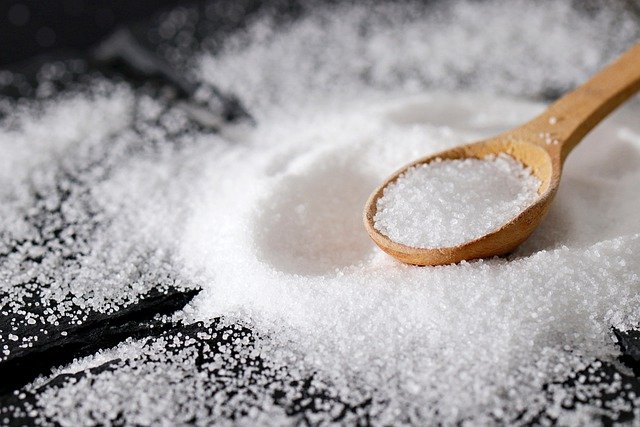
Studies show that cutting back on salt reduces your risk of stroke, heart attack, and more. Photo by mkupiec on Pixabay.
This article is part of a series on American sodium consumption. This is part 2! Read part 1 here.
Pass the salt, or pass ON the salt?
Why is cutting sodium so important? According to the American Heart Association, it could prevent a projected “450,000 cases of cardiovascular disease and save roughly $40 billion in health care costs over 20 years.” That’s certainly nothing to scoff at!
Unfortunately, even astronomically large numbers aren’t always motivating, so I’m going to talk about why this should matter to you, individually and specifically.
According to Dr. Kailey Proctor, Registered Dietitian Nutritionist (RDN), “sodium can greatly increase your risk of heart disease, high blood pressure, and kidney disease… When you are used to having a lot of salt in your food, even if you cut back a little bit, you’re going to notice…” She goes on to say that you’ll feel much better even if you cut your salt intake by super small increments! Your organs will function with renewed efficacy (especially the kidneys), you’ll prevent kidney stones, you’ll retain less water, you’ll bloat less, you’ll have more energy, you’ll have fewer headaches, and you could even lose a significant amount of weight. The list of potential benefits goes on and on.
Personally, I’m interested in reducing my salt intake to help me manage migraines. Did you know that sodium can increase your risk of stroke, something that migraine sufferers are already at an increased risk for? If you’re interested, you can read more about my personal experience with migraines here.
How to Easily Cut Back Sodium
- Eat fewer ready-made and packaged foods. As stated in this article, meals that you prepare at home tend to have much less sodium even if you find yourself reaching for your saltshaker. Bonus points if you find ways to incorporate ingredients that are “naturally low in sodium such as produce, whole grains, dried beans,” and the like.
- Explore your spice cabinet. There are so many ways to enhance flavor other than loading up on salt. Garlic powder and freshly ground black pepper are personal favorites of mine, but you can’t go wrong with flavored oils such as chili oil, balsamic vinegar, dried herbs like rosemary and thyme, Worcestershire sauce, and lemon or lime juice. Experiment with new spices, flavor combinations, and high-quality essences, juices, extracts, and oils, and you’re sure to find plenty of ways to pack a punch without salt.
- Pay attention to sodium on food labels. Sodium hides in all sorts of strange and unexpected places. Before you buy something, quickly check the nutrition label for high amounts of sodium. Monstrous salt levels can lurk in condiments, salad dressings, deli meats, dips, soups, bread, even cookies! If possible, always opt for the items with the lowest sodium.
- Try a salt substitute. Still can’t shake the salt habit? Luckily for you, healthier substitutes exist! According to this article, “salt substitutes with reduced sodium and increased potassium levels have been shown to lower blood pressure,” and significantly reduce your chances of heart attack and stroke. However, keep in mind that using potassium chloride as a salt substitute, while very close in taste, can interact dangerously with specific health conditions and medications, so be sure to speak to your doctor before making the switch.
- Try the DASH Eating Plan. DASH stands for “Dietary Approaches to Stop Hypertension.” What’s awesome about DASH is that it’s a “flexible eating plan” that “requires no special foods and instead provides daily and weekly nutritional goals.” It focuses on lowering bad cholesterol and teaching people how to prepare meals at home that are healthy and flavorful without overloading the blood with sodium. DASH has undergone extensive study by the National Heart, Lung, and Blood Institute and has been proven to decrease blood pressure and provide people with a roadmap for caring for their bodies long-term.
- Research the menu before dining out. Just because you’re worried about sodium doesn’t mean that you should avoid eating at restaurants with family and friends. Research the restaurant menu online before sitting down to eat. The internet has a wealth of nutritional information on just about every chain restaurant in the United States. Armed with that knowledge, you should be able to find low-sodium options that you can enjoy without putting yourself at risk. And, of course, one meal is only one meal! Don’t stress over it too much!
- Reduce your salt intake in small, gradual, easy-to-manage steps. Even if you’re 100% determined to curb your sodium consumption in one fell swoop, it’s important to ease the body into dietary changes. Before you go tossing out your saltshaker altogether and quitting sodium for good, remember that getting a healthy amount of salt in your diet is necessary to promote optimal cell function and facilitate the production of tears, sweat, blood, semen, and urine. Instead, start by making a deliberate effort to use less salt when you cook, to put the saltshaker to the side at the restaurant, and make gentle, sustainable switches when and where you can.
Have Health Insurance Questions?
We hope that this information on why and how to cut back on salt was helpful for you.
Insurance is oftentimes overwhelming and we want to shed light on the industry by answering your questions. Comment below and your question may be the topic of our next post!
If you liked this article, share it with your friends!
Empower Brokerage wants to help you find the insurance coverage you need and help you save money getting it. Stay on top of your health and give us a call at (844) 410-1320.
Get affordable health insurance quotes by clicking here.
See our other websites:

